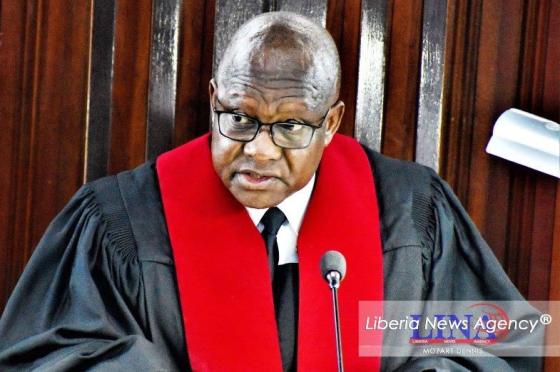Liberia: Chief Justice Korkpor Defends Judiciary

Chief Justice Francis Korkpor said judiciary focused on its primary duty of hearing and deciding cases fairly and impartially.
— “You have to look at our judgment before accusing us of being an extension of the executive and legislative. This is not true.”
Chief Justice Francis Korkpor has defended the working of the Supreme Court and the judiciary, saying the perceived belief among the public that they lack independence is wrong and not true.
Criticism of the Judiciary, Korkpor said, is often based on a misperception when in fact they decide cases according to the Constitution and laws without fear or favor and have never lacked independence.
Chief Justice Korkpor added that it is not just wrong for Liberians to think the judiciary as a whole allegedly takes instructions from the Executive and Legislative to make determinations on matters involving the two public institutions.
“Check out some of our recent judgments, particularly in election-related matters that involve the government. You will know that most of them are in favor of the opposition,” Justice Korkpor said in defense of the judiciary’s independence.
“Do you consider this as an extension of the Executive and Legislative?” the Chief Justice asked rhetorically at the induction ceremony of the Association of Judicial Reporters of Liberia. “You have to look at our judgment before accusing us of being an extension of the executive and legislative. This is not true.”
He added that the judiciary focused on its primary duty of hearing and deciding cases fairly and impartially, in compliance with the Constitution.
Korkpor's comment comes as many in the public have accused the judiciary of lack of independence due to corruption -- an allegation backed by the US Department of State’s 2021 Country Report on Human Rights. The report stated that judges and magistrates were subject to influence and engaged in corruption as a means of trying cases, granting bail to detainees, awarding damages in civil cases, or acquitting defendants in criminal cases.
Chief Justice Korkpor has also alluded to this during the opening of the May Term of Criminal Courts as he condemned judges for being involved in bribery and warned it harmed the judiciary's reputation.
Korkpor, who is expected to step down this year, having reached retirement age, has also in the past been blunt about the ‘rottenness' of the judiciary — a situation which has led many to believe that they lack independence. Last year, Associate Justice Yusuf D. Kaba made it clear to the public that the Judiciary is corrupt — warning that such action risks losing public confidence.
But for Justice Korkpor, Liberians need to see the judiciary as their own and not for him or the other justices, if the country's peace would be sustained.
“We do not own the judiciary; it is for every one of us. It is for the Liberian people. You have to engage us and we will engage you to maintain the confidence in the justice system of our country and to work together for the peace and stability of our country,” Korkpor noted. “None of us justices or judges are above the law. If we, judges or lawyers, were to do anything wrong, we have some integrity institutions that investigate unethical breaches carried out by judges and lawyers, and some of them have been punished based on the recommendation from the investigation.”
Meanwhile, Korkpor's latest remark comes a month after he accused judges of failing to execute their judicial duties in a timely fashion as they keep in jail individuals accused of a crime in jail over the period allowed by statute without trial — a practice he says amounts to human rights violation.
However, he is leaving the Supreme Court swirling in controversy over the impeachment of former Associate Justice Kabineh Ja’neh.
Critics claim that the impeachment procedure was marred by constitutional infractions, which might have major ramifications for the future administration of justice in Liberia. However, Korkpor has constantly defended the tenure of his bench and dismissed such charges, claiming that the procedure was carried out per the law.
Yet, the Chief Justice’s view is not shared by the ECOWAS Court of Justice, who ruled in favor of Associate Justice Ja’neh, after Ja’neh filed a complaint to the regional court that his rights to a fair hearing were violated.
